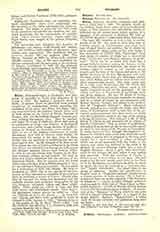

Bolzano, BERNHARD, Austrian mathematician and philosopher, b. at Prague, October 5, 1781; d. December 18, 1848. As a student he devoted himself chiefly to mathematics with marked success. Against the wish of his father, he entered the ecclesiastical state and was ordained in 1805. In the same year he was appointed professor of the philosophy of religion in the University of Prague. His lectures and discourses were strongly tinged with rationalism, and it was not long before he was denounced to the ecclesiastical authorities. Through the personal intervention of the Prince-Archbishop Salm-Salm of Prague, he retained his professor-ship until 1820, when the long-threatened dismissal was suddenly put into effect in consequence of disorders that occurred in the seminary of Leitmeritz then under the direction of Dr. Fessl, who, as a disciple and friend of Bolzano, was strongly imbued with the latter’s rationalizing spirit. Bolzano spent the remainder of his life in studious retirement, first on the estate of his friend Johann Hoffmann, at Techobuz, near Prague, and later in the house of his brother at Prague. A small pension, and the generosity of Count Leo Thun, relieved him of all monetary care.
Bolzano was always a loyal son of the Catholic Church. There is, however, a strong rationalizing tendency in his writings on doctrinal subjects, and his refusal to retract several propositions taken from his printed works justified his dismissal from the University of Prague. Bolzano’s contributions to the science of mathematics are of the highest order. In 1804 he published a theory of parallel lines which anticipated Legendre’s well-known theory. He shares with Cauchy the honor of having developed the theory of functions of one Teal variable. He made notable additions to the theory of differentiation, to the concept of infinity, and to the binomial theorem. As a philosopher, Bolzano had no sympathy for speculation as such. His mathematical bent made him a partisan of strict, methodic inquiry. His contributions to philosophy comprise a textbook on the “Science of Religion” (4 vols., Sulzbach, 1834), and one on the “Science of Knowledge” (4 vols., Sulzbach, 1837). Bolzano’s complete writings fill twenty-five volumes. The full list is found in the “Sitzungsberichte” of the Vienna Academy (1849).
MATTHIAS LEIMKUHLER

